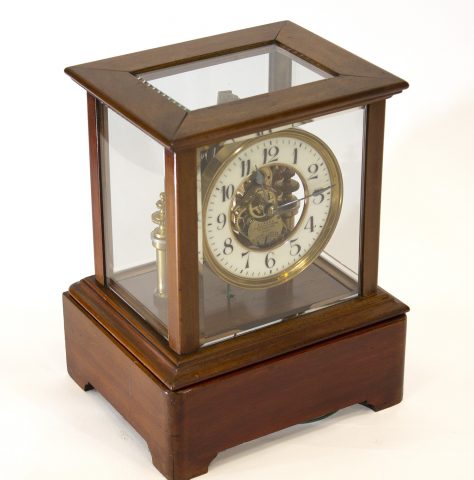5-glass Eureka Clock

An electromagnetic balance mantel timepiece, serial number 3105 dated c.1910, by the Eureka Clock Company Limited.
The clock is supported on a mahogany base with a five glass lift-off lid.
The electromagnetic movement has a large bimetallic balance with timing weights around its circumference. To the centre of the balance is a ball bearing pivot over a regulation adjustment scale which is inscribed EUREKA CLOCK Co. LTD., LONDON , PAT. No. 14614 – 1906, No. 3105, MADE IN ENGLAND.
The 4¼-inch convex enamel dial ring sits within a cast brass bezel. The dial has Arabic numerals and blued steel spade hands.
The battery compartment is hidden under the base of the clock, and contains a regulated battery which takes 4 x standard ‘C’ batteries.The Eureka mantel timepiece was invented by Timothy Bernard Powers of New York shortly after 1900 and Patented in 1906.
History
The Eureka mantel timepiece was invented by Timothy Bernard Powers of New York shortly after 1900 and Patented in 1906.
The Eureka Clock Company in London, England made these clocks between 1908 and 1914, and it is thought that around 10,000 were made by them before their demise in 1914. The design of the balance is such that a constant voltage (of c.1.5 volts) is required to ensure consistency in the amplitude of oscillation. Unfortunately early 20th century battery technology struggled to deliver a suitably stable output hence such timepieces acquired a reputation for poor timekeeping. Nowadays, good timekeeping can be achieved through the use of regulated cells which provide a much more consistent voltage output.
- Height: 26cms
- Width: 21cms
- Depth: 17cms
Overhauled and guaranteed for 3 years